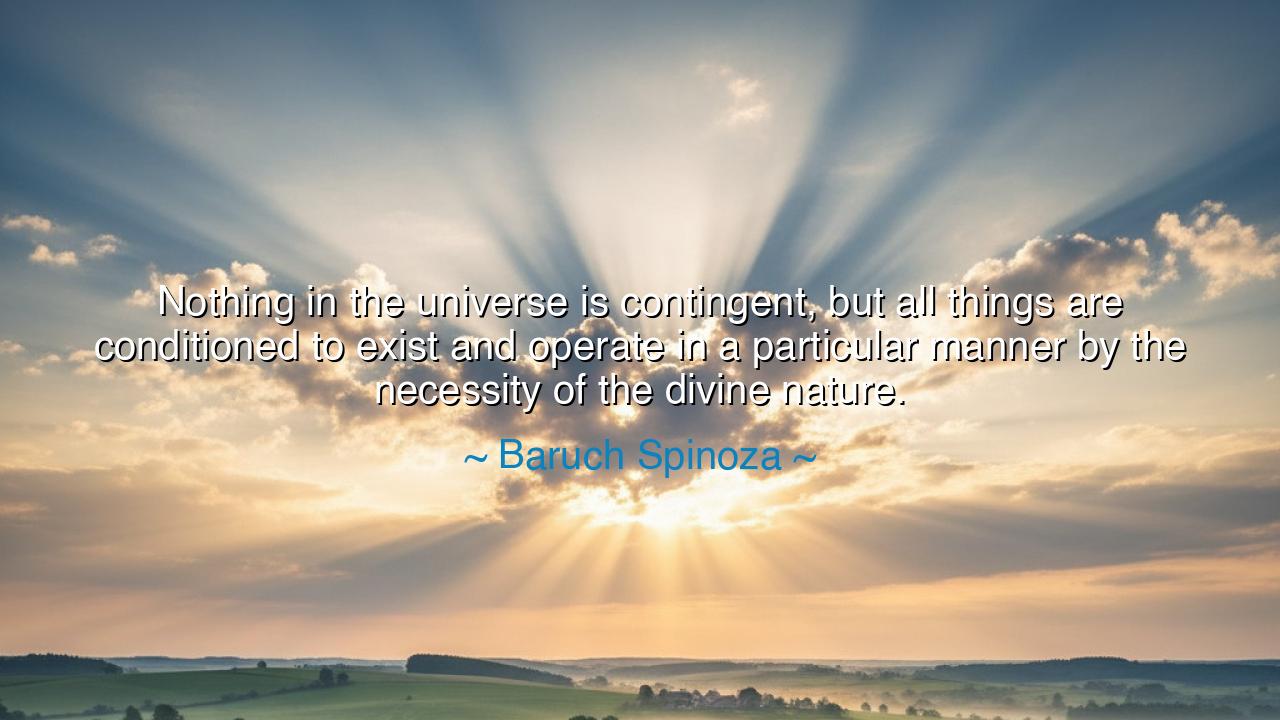
Nothing in the universe is contingent, but all things are
Nothing in the universe is contingent, but all things are conditioned to exist and operate in a particular manner by the necessity of the divine nature.






Hear the solemn words of Baruch Spinoza, who, in the seventeenth century, peered into the depths of reality and declared: “Nothing in the universe is contingent, but all things are conditioned to exist and operate in a particular manner by the necessity of the divine nature.” These words burn with the fire of philosophy, and they summon us to see existence not as accident or chaos, but as the unfolding of a grand and ordered design. For Spinoza believed that all things, from the smallest grain of sand to the loftiest star, move according to the eternal necessity of God’s being.
The meaning of this quote rests in the rejection of chance. Spinoza proclaims that there is no “perhaps” in the structure of existence. All is necessary, all is bound, all is woven into the infinite tapestry of the divine. To him, God was not a distant ruler who occasionally interferes with creation, but the very substance of all that is. Every leaf that falls, every birth, every death, every storm, every silence—these are not random, but expressions of a deeper order, conditioned by the eternal nature that sustains them.
The origin of this thought lies in Spinoza’s magnum opus, Ethics, where he set forth his vision of the world as a single substance: God or Nature (Deus sive Natura). He argued that to exist is to be necessary, for nothing can exist apart from the divine, and nothing happens outside its laws. Thus, contingency—the idea that something might be otherwise—is an illusion born of our limited perspective. We see fragments of the whole, and so imagine chance. But if we could behold existence as God beholds it, we would see that all things flow with inevitability, like rivers returning to the sea.
Consider the story of Marcus Aurelius, emperor and Stoic, who reigned in times of war and plague. He too believed that events, though painful, were woven by necessity. When the Antonine Plague swept through Rome, Marcus did not rage against fortune, but accepted it as part of the natural order. He sought instead to live virtuously within the bounds of necessity. In this, he mirrored Spinoza’s wisdom: though we cannot choose what happens, we can choose how to meet it, with reason, courage, and reverence. The emperor’s endurance reminds us that to understand necessity is not to despair, but to find freedom in aligning ourselves with it.
This vision may seem stern, for it leaves no room for the comfort of chance. Yet it also brings peace. If nothing is contingent, then the burdens we bear are not meaningless, nor are the joys we find mere accidents. Each moment is as it must be, shaped by the divine fabric of existence. This truth can anchor the restless soul, teaching us to cease our struggle against what cannot be altered, and instead to live with clarity, compassion, and acceptance.
The lesson is clear: we must learn to see ourselves not as masters outside the order of things, but as threads within the eternal tapestry. To fight necessity is to fight reality itself, but to embrace it is to move in harmony with the divine. This does not mean we are powerless; rather, our power lies in understanding and aligning ourselves with the laws that govern us. Just as a sailor cannot command the winds but can learn to set his sails, so too we cannot change necessity, but we can learn to live well within it.
Practically, this calls us to cultivate patience, humility, and wisdom. When faced with trials, ask: What is within my control, and what belongs to necessity? When blessed with joy, receive it as part of the eternal gift. When wronged by others, remember that even their flaws flow from causes beyond our sight. In this way, we rise above resentment and despair, and instead walk with the calm strength of one who knows that all things are rooted in the divine nature.
So, children of tomorrow, take Spinoza’s words to heart. Nothing in the universe is contingent; nothing is wasted, nothing is without cause. Live then with courage, not fearing fate but embracing it. See in every breath, every event, every encounter, the unfolding of the divine necessity. For to live in harmony with this truth is to find freedom, peace, and the wisdom of eternity.






AAdministratorAdministrator
Welcome, honored guests. Please leave a comment, we will respond soon